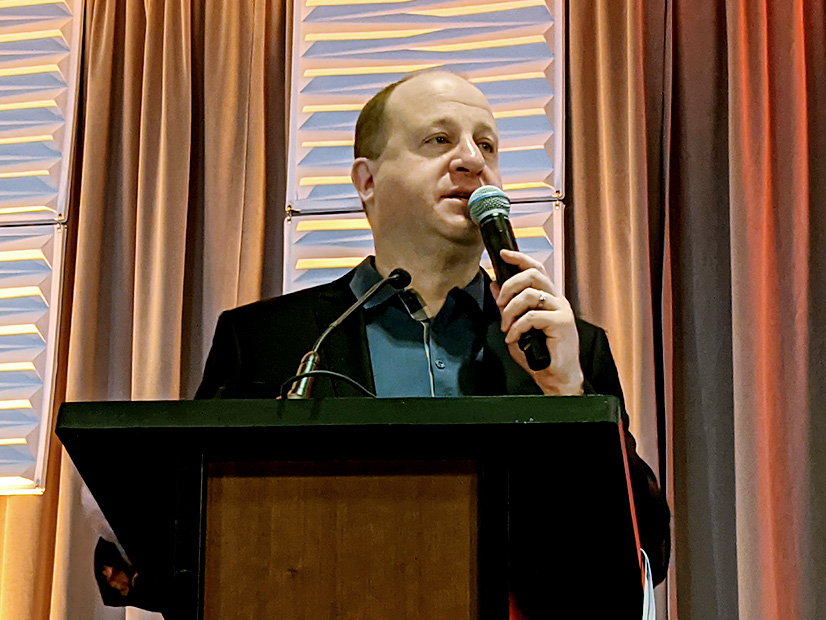
DENVER — Gov. Jared Polis last week joined energy industry stakeholders at the Colorado Solar and Storage Association’s 2022 Solar Power and Energy Storage Mountain West Conference to discuss the state’s future renewable energy economy.
Despite having trekked through a foot of snow to make it to the Feb. 2 conference, Polis was grateful to be able to speak for a live audience.
Writing in Colorado’s Greenhouse Gas Pollution Reduction Roadmap issued in January, Polis said that GHG reduction commitments from electric utilities are key to meeting the state’s carbon goals.
On Wednesday, the governor announced that most of the state’s largest utilities have submitted required clean resource plans showing regulators how they plan to achieve 80% emissions reduction compared to 2005 levels by 2030. He believes it’s possible that utilities will reduce emissions beyond the 80% goal.
“That’s the floor not the ceiling, but it’s a very, very aggressive floor,” he said.
Coal plant retirements are also an important piece of the state’s climate plan. As aesthetically displeasing as they are bad for air quality, coal plants are “urban blights” that only cost ratepayers more money, Polis said.
“Coal is our most expensive form of electricity in Colorado … and we really have to ask ourselves how long are we going to force Coloradans to pay more on their electric bills just to keep our coal plants going?”
With many of the state’s utilities moving toward carbon-free generation, Polis is most interested in keeping these renewable energy projects as low-cost as possible. With some “downward pressure” on the solar industry, Polis is optimistic that solar projects could come in under 3 cents/kWh, but he lamented the supply issues and costs the industry faces.
“We hope that President Biden discontinues the tariffs for China. That will help a lot,” he said. “Because whenever you think of the geopolitical landscape … the clean energy transition is something that should bring us together. We need the lowest cost solar panels possible, and I don’t care where they’re made. We need to get them done; we need to get the cost down.”’
On Friday, Biden extended the tariffs, but softened the blow by continuing an exemption for bifacial panels and doubling the amount of imports that can enter the country duty free each year, from 2.5 GW to 5 GW. (See Biden Extends Tariffs on Imported Solar Panels.)
Colorado has also made efforts to decarbonize buildings and transportation. Polis touted that, as of last month, electric vehicles made up 13% of the state’s total new vehicle sales.
Besides promoting EV sales, Polis hopes the state can modernize transportation as a whole with money state regulators budgeted to help improve air quality.
“In November, as part of our state budget, we proposed nearly half a billion dollars of one-time investments to improve air quality and accelerate the adoption of clean technology that improves the health of all Coloradoans and helps Colorado meet our climate goals.” Polis said.
The state hopes to use the funds to “improve transit opportunities, electrify school buses … replace the state’s oldest, polluting diesel trucks and grow the market for electric bicycles, giving rebates for rideshare programs and subsidies for low-income folks to be able to commute to work on e-bikes.”
Planning Ahead: Organized Markets
Looking to the next decade, Polis said joining an organized market will be integral to achieving the state’s long-term climate goals.
“In 2019, I signed into law the Colorado Transmission Coordination Act, which directed the PUC [Colorado Public Utilities Commission] to investigate the possible merits of joining an organized market,” Polis said.
In December, the PUC released a report saying that state utilities could save up to $230 million by joining a wholesale electric market. (See Colo. PUC: State Could Save up to $230M in Wholesale Market.)
“We now know what we suspected: that Colorado’s participation in a regional market is likely to reduce costs, improve the safety and reliability of the grid and advance our climate and clean energy goals,” the governor said.
In January, Xcel, Public Service Company of Colorado, Platte River Power Authority and Black Hills Colorado Electric chose to join SPP’s Western Energy Imbalance Service, which Polis described as “progress in the right direction.” (See Colorado Utilities Choose WEIS over WEIM.)
“A Western market is really an important part of reaching our clean energy goals faster and at a lower cost,” he said.


